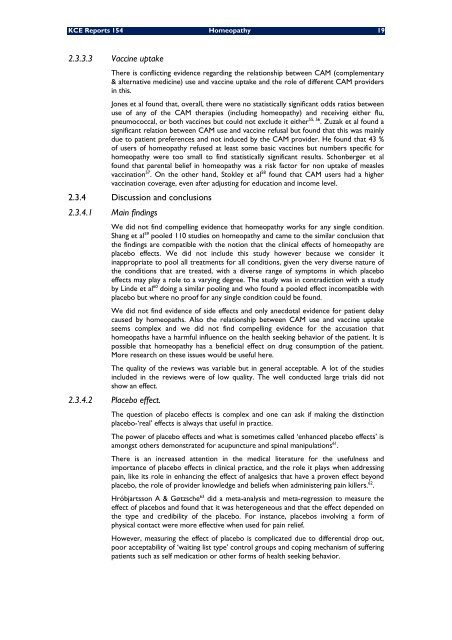Etat des lieux de l'homéopathie en Belgique - KCE
Etat des lieux de l'homéopathie en Belgique - KCE
Etat des lieux de l'homéopathie en Belgique - KCE
Create successful ePaper yourself
Turn your PDF publications into a flip-book with our unique Google optimized e-Paper software.
<strong>KCE</strong> Reports 154 Homeopathy 19<br />
2.3.3.3 Vaccine uptake<br />
There is conflicting evi<strong>de</strong>nce regarding the relationship betwe<strong>en</strong> CAM (complem<strong>en</strong>tary<br />
& alternative medicine) use and vaccine uptake and the role of differ<strong>en</strong>t CAM provi<strong>de</strong>rs<br />
in this.<br />
Jones et al found that, overall, there were no statistically significant odds ratios betwe<strong>en</strong><br />
use of any of the CAM therapies (including homeopathy) and receiving either flu,<br />
pneumococcal, or both vaccines but could not exclu<strong>de</strong> it either 55, 56 . Zuzak et al found a<br />
significant relation betwe<strong>en</strong> CAM use and vaccine refusal but found that this was mainly<br />
due to pati<strong>en</strong>t prefer<strong>en</strong>ces and not induced by the CAM provi<strong>de</strong>r. He found that 43 %<br />
of users of homeopathy refused at least some basic vaccines but numbers specific for<br />
homeopathy were too small to find statistically significant results. Schonberger et al<br />
found that par<strong>en</strong>tal belief in homeopathy was a risk factor for non uptake of measles<br />
vaccination 57 . On the other hand, Stokley et al 58 found that CAM users had a higher<br />
vaccination coverage, ev<strong>en</strong> after adjusting for education and income level.<br />
2.3.4 Discussion and conclusions<br />
2.3.4.1 Main findings<br />
We did not find compelling evi<strong>de</strong>nce that homeopathy works for any single condition.<br />
Shang et al 59 pooled 110 studies on homeopathy and came to the similar conclusion that<br />
the findings are compatible with the notion that the clinical effects of homeopathy are<br />
placebo effects. We did not inclu<strong>de</strong> this study however because we consi<strong>de</strong>r it<br />
inappropriate to pool all treatm<strong>en</strong>ts for all conditions, giv<strong>en</strong> the very diverse nature of<br />
the conditions that are treated, with a diverse range of symptoms in which placebo<br />
effects may play a role to a varying <strong>de</strong>gree. The study was in contradiction with a study<br />
by Lin<strong>de</strong> et al 60 doing a similar pooling and who found a pooled effect incompatible with<br />
placebo but where no proof for any single condition could be found.<br />
We did not find evi<strong>de</strong>nce of si<strong>de</strong> effects and only anecdotal evi<strong>de</strong>nce for pati<strong>en</strong>t <strong>de</strong>lay<br />
caused by homeopaths. Also the relationship betwe<strong>en</strong> CAM use and vaccine uptake<br />
seems complex and we did not find compelling evi<strong>de</strong>nce for the accusation that<br />
homeopaths have a harmful influ<strong>en</strong>ce on the health seeking behavior of the pati<strong>en</strong>t. It is<br />
possible that homeopathy has a b<strong>en</strong>eficial effect on drug consumption of the pati<strong>en</strong>t.<br />
More research on these issues would be useful here.<br />
The quality of the reviews was variable but in g<strong>en</strong>eral acceptable. A lot of the studies<br />
inclu<strong>de</strong>d in the reviews were of low quality. The well conducted large trials did not<br />
show an effect.<br />
2.3.4.2 Placebo effect.<br />
The question of placebo effects is complex and one can ask if making the distinction<br />
placebo-‘real’ effects is always that useful in practice.<br />
The power of placebo effects and what is sometimes called ‘<strong>en</strong>hanced placebo effects’ is<br />
amongst others <strong>de</strong>monstrated for acupuncture and spinal manipulations 61 .<br />
There is an increased att<strong>en</strong>tion in the medical literature for the usefulness and<br />
importance of placebo effects in clinical practice, and the role it plays wh<strong>en</strong> addressing<br />
pain, like its role in <strong>en</strong>hancing the effect of analgesics that have a prov<strong>en</strong> effect beyond<br />
placebo, the role of provi<strong>de</strong>r knowledge and beliefs wh<strong>en</strong> administering pain killers. 62 .<br />
Hróbjartsson A & Gøtzsche 63 did a meta-analysis and meta-regression to measure the<br />
effect of placebos and found that it was heterog<strong>en</strong>eous and that the effect <strong>de</strong>p<strong>en</strong><strong>de</strong>d on<br />
the type and credibility of the placebo. For instance, placebos involving a form of<br />
physical contact were more effective wh<strong>en</strong> used for pain relief.<br />
However, measuring the effect of placebo is complicated due to differ<strong>en</strong>tial drop out,<br />
poor acceptability of ‘waiting list type’ control groups and coping mechanism of suffering<br />
pati<strong>en</strong>ts such as self medication or other forms of health seeking behavior.

















